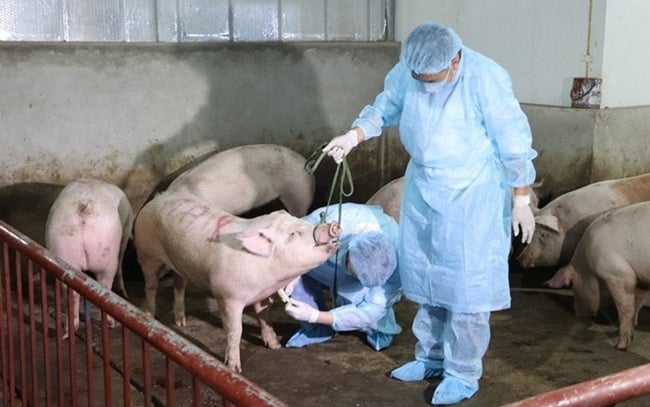May 17, 2025 | 17:41 GMT +7
May 17, 2025 | 17:41 GMT +7
Hotline: 0913.378.918
May 17, 2025 | 17:41 GMT +7
Hotline: 0913.378.918

Deputy Minister of Agriculture and Rural Development Phung Duc Tien (left) and Director of the Department of Animal Health Nguyen Van Long chaired the conference. Photo: Linh Linh.
During the Conference on Implementing Solutions for the Prevention and Control of Livestock and Poultry Diseases in the Last Half of 2024, which took place on the morning of June 17, Deputy Minister of Agriculture and Rural Development Phung Duc Tien urged the People's Committees of provinces and cities to instruct local authorities and specialized agencies to effectively and comprehensively implement preventive measures for livestock and poultry diseases, particularly those that pose a significant threat, in order to prevent outbreaks instead of merely responding to them.
Deputy Minister Phung Duc Tien notes that trade promotion in the veterinary sector has had favorable developments, facilitating the export of Vietnamese products to several nations. To sustain this growing momentum, it is essential to have a high level of integration.
To enhance exports and secure domestic supply, it is crucial to prioritize three key areas of development. These include implementing comprehensive projects and policies, establishing a comprehensive framework of regulatory regulations, and promoting the growth of companies related to breeding, animal feed, slaughtering, and science and technology.
Localities must rigorously enforce laws and actively combat smuggling to guarantee exports' safety. Businesses must rigorously adhere to slaughtering and processing activities. Clear advice documents should be provided for mandatory vaccination.
The Deputy Minister confirmed that disease prevention has yielded positive outcomes, however, the disease landscape remains intricate, with avian influenza resulting in deaths, rabies, and ASF still presenting in certain areas. Therefore, it is imperative to collaborate in research endeavors to comprehend the transmission mechanisms to provide reassurance.
Vaccines are commonly regarded as a robust defense mechanism. Consequently, the Deputy Minister emphasized the need to prioritize efforts in combatting ASF due to the persistently low vaccination rate and the rapid spread of the disease.
According to reports presented at the conference, African Swine Fever (ASF) was detected in 410 communes across 40 provinces and cities during the first half of the year. This led to the culling of more than 17,400 pigs, marking a 53.74% increase compared to the same period in the previous year.
At now, there are foot-and-mouth disease outbreaks occurring in 44 communes in 13 provinces and towns. Animals suspected of rabies have been found in 34 provinces and towns. Outbreaks of lumpy skin disease in cattle have occurred in over 60 communes in 9 provinces. Avian influenza A/H5N1 has been reported in 7 provinces, leading to the slaughter of over 12,000 chickens.

Mr. Nguyen Van Long, the Director of the Department of Animal Health, has urged towns experiencing outbreaks of African Swine Fever (ASF) to officially disclose the outbreak to prevent its transmission to nearby areas. Photo: Dieu Linh.
Significantly, there has been one recorded fatality caused by avian influenza A/H5N1 and one individual who contracted avian influenza A/H9N2, among other cases.
Given the growing threat of disease outbreaks, which could have a major impact on food supply, the Consumer Price Index (CPI), public health, and the environment, local authorities claim that it is crucial to implement comprehensive, decisive, and effective measures to control and prevent livestock and poultry diseases. This involves deploying resources to comprehensively tackle current epidemics and proactively prevent the emergence of new ones.
Localities should coordinate and implement vaccination campaigns targeting livestock, with the objective of achieving a minimum immunization rate of 80%. In addition, it is imperative to construct areas for breeding that are free from diseases, advocate for steps to prevent and control diseases, and actively provide assistance to farmers who are impacted by diseases.
A spokesperson from Son La Province reported that there are an estimated 718 livestock establishments in the region, highlighting the crucial need for disease preventive measures. This is because any outbreak directly affects the income of locals and the overall GDP of the province. Son La has implemented communication strategies to disseminate information to the public regarding policies and organizational methodologies, which can be replicated in other areas. Each province should allocate funds for disease prevention and control with the assistance of the central government.
Ms. Dinh Thu Thu, Deputy Director of the Department of Agriculture and Rural Development of Lạng Sơn Province, proposed that the Ministry of Agriculture and Rural Development (MARD) and the Department of Animal Health should designate African Swine Fever as a compulsory vaccination. Implementing this measure will mitigate financial losses for farmers in the event of pig mortality, even after vaccination, by ensuring they receive appropriate compensation.
Moreover, it is imperative for the neighboring provinces and towns to enhance their disease prevention endeavors and enhance the supervision of breeding stock to avert the unlawful importation of cattle.
Mr. Nguyen Van Long, the Director of the Department of Animal Health, has urged towns experiencing outbreaks of African Swine Fever (ASF) to officially disclose the outbreak to prevent its transmission to nearby areas. He notably asked Lang Son to officially declare the outbreak at both the district and provincial levels, in line with the actions taken by other provinces.
Mr. Long stated that the Veterinary Law and accompanying circulars have explicit requirements regarding required immunization for ASF. The MARD has issued official paperwork, and the Prime Minister has instructed localities to meticulously carry out this task.
According to Mr. Long, the provinces of Bac Kan, Lang Son, and Quang Ninh are currently facing complicated situations with African Swine Fever (ASF). It is necessary to concentrate efforts on disease control and coordinate vaccination campaigns in these areas.
Mr. Nong Quang Nhat, Vice Chairman of the People's Committee of Bac Kan Province, emphasized that the province is experiencing the most severe impact from African Swine Fever (ASF). Controlling illness has been difficult since farmers are not reporting cases, the province is very large, there are many small-scale farms, and there are not enough enforcement staff.
Mr. Nhat emphasized that successful disease control in the future necessitates more focus and enhanced collaboration among pertinent ministries, agencies, law enforcement, market management, and especially local government leaders at the commune level.
Translated by Dieu Linh

(VAN) The United Nations designated 22 May as the International Day for Biodiversity 2025 with the theme 'Harmony with nature and sustainable development.'
![Multi-channel, multi-directional Vietnamese agricultural markets: [8] A national strategy is needed](https://t.ex-cdn.com/nongnghiepmoitruong.vn/608w/files/phucpm/2025/05/15/1435-thi-truong-nong-san-viet-da-kenh-da-huongbai-8-can-mot-chien-luoc-quoc-gia-084750_728.jpg)
(VAN) The Chairman of Hung Nhon Group shared: ‘Opening up and tapping into new markets is the right and strategic direction for Vietnam's agricultural sector.’

(VAN) Food waste has become a serious issue in modern society, especially in rapidly urbanizing and developing cities like Hanoi.
![Multi-channel, multi-directional Vietnamese agricultural markets: [7] Deep processing makes global reach easy](https://t.ex-cdn.com/nongnghiepmoitruong.vn/608w/files/huytd/2025/05/16/2946-che-bien-sau-chia-khoa-vang-nang-tam-nong-san-viet-tren-ban-do-the-gioi-080603_110-093858.jpg)
(VAN) The application of deep processing technology is helping Vietnamese agricultural products enhance their value, create competitive advantages, and open doors to conquer global consumers.
![Multi-channel, multi-directional Vietnamese agricultural markets: [6] Agri products go online](https://t.ex-cdn.com/nongnghiepmoitruong.vn/608w/files/content/2024/12/10/1-113313_954.jpg)
(VAN) Bringing agri products onto e-commerce platforms is an effective way to build a brand that many businesses, cooperatives, and agricultural production households are doing.

(VAN) Veterinary training should focus on quality, not just quantity. Veterinarians also need more options to pursue specialized training.

(VAN) The veterinary industry needs to be viewed objectively and further invested in to properly demonstrate its role and importance in the new context.